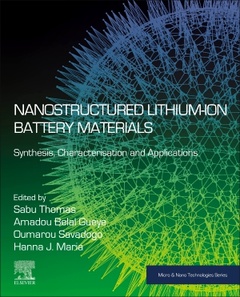Nanostructured Lithium-ion Battery Materials Synthesis, Characterization, and Applications Micro and Nano Technologies Series
Coordonnateurs : Thomas Sabu, Savadogo Oumarou, Gueye Amadou Belal, Maria Hanna J.

Nanostructured Lithium-ion Battery Materials: Synthesis and Applications provides a detailed overview of nanostructured materials for application in Li-ion batteries, supporting improvements in materials selection and battery performance. The book begins by presenting the fundamentals of Lithium-ion batteries, including electrochemistry and reaction mechanism, advantages and disadvantages of Li-ion batteries, and characterization methods. Subsequent sections provide in-depth coverage of a range of nanostructured materials as applied to cathodes, electrolytes, separators, and anodes. Finally, other key aspects are discussed, including industrial scale-up, safety, life cycle analysis, recycling, and future research trends. This is a valuable resource for researchers, faculty, and advanced students across nanotechnology, materials science, battery technology, energy storage, chemistry, applied physics, chemical engineering, and electrical engineering. In an industrial setting, this book will be of interest to scientists, engineers, and R&D professionals working with advanced materials for Li-ion batteries and other energy storage applications.
Part I: Introduction to Lithium-ion Battery Systems 1. Introduction and History of Lithium-ion Batteries 2. Electrochemistry and Basic Reaction Mechanism of Lithium-ion Batteries 3. Advantages and Disadvantages of Lithium-ion Batteries 4. Characterization Methods for Lithium-ion Batteries Part II: Nanostructured Cathode Materials for Li-ion Batteries 5. Nanosized Coatings on Cathode Materials 6. Hollow Carbon Spheres and Their Hybrid Nanomaterials as Cathode Materials 7. Nanostructured Conductive Polymers as Active Electrode Composites 8. Nanostructured Metal-Oxides as Cathode Materials Part III: Nanostructured Electrolyte Materials for Li-ion Batteries 9. Aqueous Electrolyte for Li-ion Batteries 10. Non-aqueous Electrolyte for Li-ion Batteries 11. Ionic Liquid Electrolyte for Li-ion Batteries 12. Polymer Electrolyte for Li-ion Batteries 13. Hybrid Electrolyte for Li-ion Batteries Part IV: Nanostructured Separator Materials for Li-ion Batteries 14. Functionalized Polyolefin Separators 15. Nanostructures Separators Based on Non-Polyolefin Polymers Part V: Nanostructured Anode Materials for Li-ion Batteries 16. Nanostructured CNT-Metal Oxide Composites as Cathode Materials 17. Nanostructured Graphene-Oxide Composites as Cathode Materials 18. Carbonaceous Nanostructured Materials as Anodes 19. Titanium based Oxides as Anodes 20. Metal Alloys Materials as Anodes 21. Nanostructured Transition Metal Oxides as Anodes 22. Metal Chalcogenides as Anode Materials 23. MXene-based Nanomaterials as Anode Materials Part VI: Future Outlook and Challenges 24. Lithium-ion Batteries: From Lab to Industry and Safety 25. Life Cycle Analysis of Lithium-ion Batteries 26. Lithium-ion Batteries: Future Market, Challenges, and Recycling
Professor Sabu Thomas is the Director of Centre for Nanoscience and Nanotechnology, Mahatma Gandhi University, Kottayam, Kerala, India. He is also currently the Chairman of the Trivandrum Engineering Science and Technology Research Park (TrESPARK), Trivandrum, Kerala, India. He was the former Vice Chancellor of Mahatma Gandhi University, Kottayam, Kerala, India. Prof. Thomas is a highly committed teacher and a remarkably active researcher well-known nationally and internationally for his outstanding contributions in polymer science and nanotechnology. He has published over 1400 research articles in international refereed journals. and has also edited and written 210 books. His H-index is 140 and total citations are more than 94,000. He has supervised 125 PhD theses. He has received many international and national awards and recognitions. Under the leadership of Prof. Thomas, Mahatma Gandhi University has been transformed into a top University in India.
Prof. Oumarou Savadogo is Full Professor and UNESCO Chair on Sustainable Engineering and Applied Solar Technologies, at Polytechnique Montréal, Quebec, Canada.
With a background in materials science, he was also previously a process engineer at Rhône-Siltec (production of silicon for photovoltaic solar cells) and a postdoctoral fellow at CNRS-Bellevue, both in France. At Polytechnique Montréal, he is Founding Director of the Laboratory of New Materials for Energy and Electrochemistry, and is responsible for the graduate programs on Renewable Energy in Energy Engineering and Energy and Sustainable Development in Chemical Engineering. Prof. Savadogo’s research interests include the development of new materials for solar energy, fuel cells, batteries, electrochemical capacitors, electrochemistry, metallurgical processes, corrosion, and microbial cells. He is author or co-author of more than 200 scientific publications in refereed scientific journals, Founding Editor of the Journal of New Materials fo
- Introduces fundamental of Lithium-ion batteries, electrochemistry, and characterization methods
- Offers in-depth information on nanostructured cathode, electrolyte, separator, and anode materials
- Addresses lab to industry challenges, safety, lifecycle analysis, recycling, and future opportunities
Date de parution : 11-2024
Ouvrage de 700 p.
19x23.3 cm
Thèmes de Nanostructured Lithium-ion Battery Materials :
Mots-clés :
lithium; Li; ion; battery; materials; nanostructured; nanomaterial; life cycle; cathode; electrolyte; separator; anode



